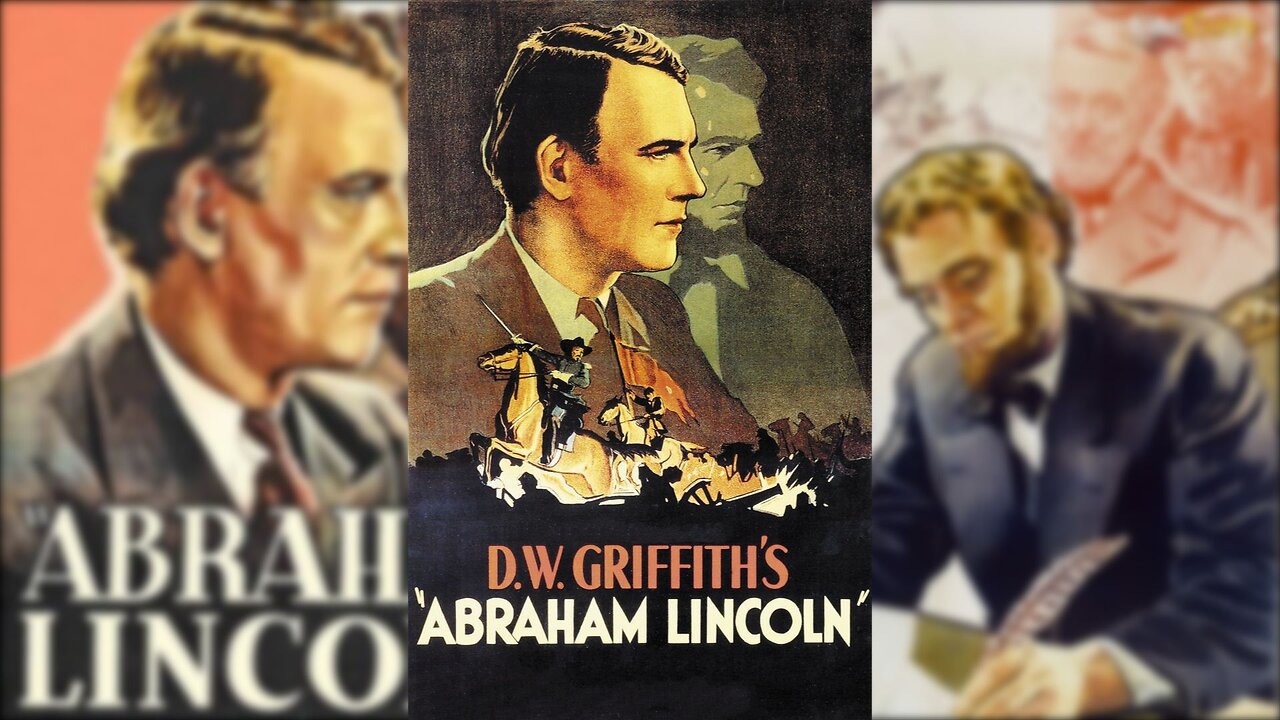Premium Only Content

ABRAHAM LINCOLN (1930) Walter Huston & Una Merkle | Biography, Drama, War | B&W
Abraham Lincoln, also released under the title D. W. Griffith's "Abraham Lincoln", is a 1930 pre-Code American biographical film about Abraham Lincoln directed by D. W. Griffith. It stars Walter Huston as Lincoln and Una Merkel, in her second speaking role, as Ann Rutledge. The script was co-written by Stephen Vincent Benét, author of the Civil War prose poem John Brown's Body (1928), and Gerrit Lloyd. This was the first of only two sound films made by Griffith.
SYNOPSIS
An episodic biography of the 16th President of the United States.
The first act of the film covers Lincoln's early life as a storekeeper and rail-splitter in New Salem and his early romance with Ann Rutledge, and his early years as a lawyer and his courtship and marriage to Mary Todd in Springfield, Illinois. The majority of the film deals with Lincoln's presidency during the American Civil War and culminates with Lee's surrender and Lincoln's assassination at Ford's Theatre.
CAST & CREW
W. L. Thorne as Tom Lincoln
Lucille La Verne as Mid-Wife
Helen Freeman as Nancy Hanks Lincoln
Otto Hoffman as Offut
Walter Huston as Abraham Lincoln
Edgar Deering as Armstrong
Una Merkel as Ann Rutledge
Russell Simpson as Lincoln's Employer
Charles Crockett as Sheriff
Kay Hammond as Mary Todd Lincoln
Helen Ware as Mrs. Edwards
E. Alyn Warren as Stephen A. Douglas
Jason Robards as Herndon
Gordon Thorpe as Tad Lincoln
Ian Keith as John Wilkes Booth
Cameron Prudhomme as John Hay (secretary to the president)
James Bradbury, Sr. as General Scott
Jimmie Eagle as Young Soldier
E. Alyn Warren as General Grant
Oscar Apfel as Secretary of War Stanton
Frank Campeau as General Sheridan
Hobart Bosworth as General Lee
Henry B. Walthall as Colonel Marshall
Directed by D. W. Griffith
Written by Stephen Vincent Benét (adapted for the screen), John W. Considine Jr. (story and production adviser), Stephen Vincent Benét and Gerrit Lloyd (continuity and dialogue)
Produced by D. W. Griffith, Joseph M. Schenck
Cinematography Karl Struss
Edited by James Smith, Hal C. Kern (editorial adviser)
Music by Hugo Riesenfeld (music arrangements)
Production company United Artists
Distributed by United Artists
Release date: August 25, 1930
Running time: 94 minutes
Country: United States
Language: English
NOTES
The film received positive reviews from contemporary critics. Mordaunt Hall of The New York Times called it "quite a worthy pictorial offering with a genuinely fine and inspiring performance by Walter Huston in the role of the martyred President" and later put it on his year-end list of the ten best films of 1930. "More than an outstanding classic of sound pictures, Abraham Lincoln eclipses the most conservative illusion of a modernized Birth of a Nation", wrote Variety in a rave review. "It is a startlingly superlative accomplishment; one rejuvenating a greatest Griffith. In characterization and detail perfection it is such as to be almost unbelievable." Film Daily called it a "distinguished and human narrative" and wrote that Huston's performance "may be listed as one of the 10 best of the year – or any talker year."John Mosher of The New Yorker wrote that it was "by and large.....a pretty high-grade picture." Despite these accolades, however, the film's box office performance was uneven.
Abraham Lincoln is part of the David Wark Griffith collection at the Museum of Modern Art, and it was donated as a gift from screenwriter-producer Paul Killiam, a collector of silent movies. Funding for the preservation of this film was provided by The Lillian Gish Trust for Film Preservation, The Film Foundation, and the Hollywood Foreign Press Association.
More recent assessments of Abraham Lincoln have been less effusive in their praise of the film, finding that Abraham Lincoln has not aged well. In 1978, the film was included as one of the choices in the book The Fifty Worst Films of All Time, criticizing the film's historical inaccuracies, instances of clumsy dialogue and Merkel's melodramatic acting style. Glenn Erickson, reviewing the DVD in 2012, wrote that it "comes off as an interesting curio. Its earnest simplicity seems more dated than ever, despite the fine performance of Walter Huston in the lead role." Film historian Melvyn Stokes found that Abraham Lincoln's episodic structure "came at the cost of dramatic tension" and suggested that the film's disappointing box office performance was due to its having "nothing of major importance and relevance to say about its subject to moviegoers of Depression-era America." Abraham Lincoln was the first sound film about the Civil War which veterans of that war could view.
-
 13:52
13:52
Lost n Found Films
20 hours agoMANOLESCU (1929) Podcast | Cinema Gem
28 -
 1:51:41
1:51:41
Dr. Drew
5 hours agoPsychics Investigate DC Black Hawk & Philadelphia Medical Plane Crashes w/ Zach Vorhies + Eddie Conner & Andrew Anderson – Calling Out w/ Susan Pinsky – Ep 166
55.9K9 -
 1:03:04
1:03:04
In The Litter Box w/ Jewels & Catturd
22 hours agoDemocrats Come Unglued | In the Litter Box w/ Jewels and Catturd Ep. 735 - 2/5/2025
68.4K40 -
 1:44:25
1:44:25
The Quartering
6 hours agoTrump Impeachment, Democrat Insurrection, Massive Scandal At Politico & DC Crash Update!
108K48 -
 LIVE
LIVE
Dr Disrespect
7 hours ago🔴LIVE - DR DISRESPECT - KINGDOM COME: DELIVERANCE 2 - FIRST IMPRESSION
2,750 watching -
 37:54
37:54
CryptoWendyO
5 hours ago $0.70 earnedBEST DAY IN CRYPTO HISTORY
30.8K4 -
 1:52:18
1:52:18
Film Threat
9 hours agoVERSUS: FANTASTIC FOUR + CAPTAIN AMERICA + QUENTIN TARANTINO'S EPIC RANT | Film Threat Versus
22.4K -
 9:06
9:06
CryptoWrld
13 hours ago $1.28 earnedHow Nonprofits Use Blockchain Tech
30K3 -
 16:38
16:38
SLS - Street League Skateboarding
15 days agoRayssa Leal's Most Clutch SLS Wins Ever! 🥶🏆
105K4 -
 1:06:29
1:06:29
Russell Brand
7 hours agoGaza Takeover? Trump’s Bold Plan Sparks Global Outrage – SF532
152K296